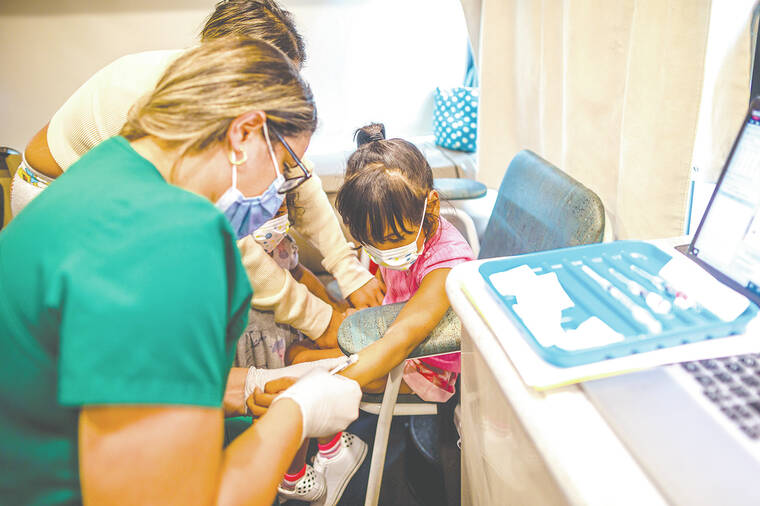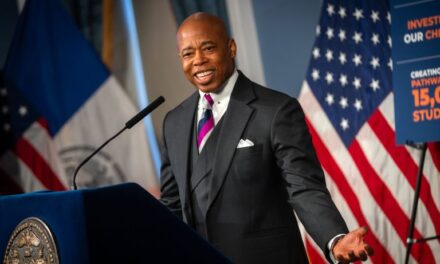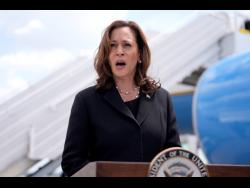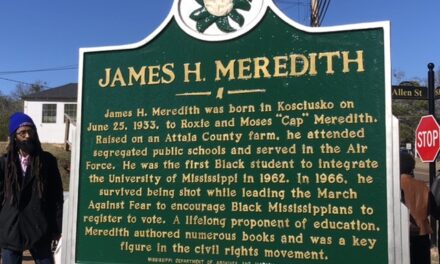
WASHINGTON — Resistance to public health, relegated to the fringes of the American right and left before COVID vaccine mandates became a cultural flashpoint and a symbol of government overreach, now has a firm foothold in Republican politics — and a chance to wield real power in Washington.
The merger of the Robert F. Kennedy Jr. and Donald Trump presidential campaigns has put the movement’s most prominent leader within reach of a White House job or federal health position. Around the country, nearly 1,000 candidates, nearly all Republican, are seeking office with the backing of Stand for Health Freedom, a Florida nonprofit.
ADVERTISING
The movement even has a Trump-inspired slogan: Make America Healthy Again.
Now the remnants of Kennedy’s campaign apparatus are organizing their efforts around Trump’s presidential bid. On Monday, former Kennedy campaign officials unveiled a new super political action committee, The MAHA Alliance, led by Del Bigtree, Kennedy’s former communications director, and Brigid Rasmussen, his former chief of staff.
“The medical freedom movement,” Bigtree said, “now finds itself inches away from being represented inside the White House and inside the regulatory agencies of America.” Bigtree, who hosts a popular podcast, “The HighWire,” is the founder of Informed Consent Action Network — an advocacy group that has worked to loosen vaccine mandates and is petitioning the Food and Drug Administration to withdraw its approval of certain vaccines for hepatitis B and polio.
In an interview Tuesday, he said The MAHA Alliance had already raised $4 million and was hoping to attract “independent voters who want to see a political system that reaches across the aisle, instead of living in this incredibly polarized atmosphere that’s tearing our nation apart.”
In a YouTube video earlier this week, Kennedy promised to “clean up the public health agencies,” including the Centers for Disease Control and Prevention, the National Institutes of Health and the FDA. He also urged viewers to buy green Make America Healthy Again hats, which are available on his website for $35.
Trump and Kennedy were to appear at a virtual “Make America Healthy Again” town hall-style meeting Tuesday night, but the event was postponed because of the coming hurricane. In September, Trump met privately at his New Jersey golf club with five medical freedom activists.
More than just rebranded anti-vaccination activism, the medical freedom movement marries fierce resistance to public health measures like vaccine mandates, deep suspicion of pharmaceutical companies and federal regulatory agencies, and an embrace of alternative medicine and natural foods. Those foods include “raw,” or unpasteurized, milk, which is being promoted by right-wing commentators and which the CDC deems dangerous. Kennedy has said he drinks it.
Many in the movement, including Kennedy, heavily emphasize freedom of speech. They feel they have been “canceled” by government agencies and social media platforms trying to tamp down COVID misinformation.
At its extremes, the movement brings together what Bigtree called “the crunchy granola moms” on the left and the libertarian right. But it has found a political home in Republican-led states and with Republican candidates.
Florida is the movement’s epicenter. When Gov. Ron DeSantis, a Republican, signed legislation banning COVID vaccine mandates last year, he bragged that he “positioned Florida as the national leader for medical freedom.” The state’s surgeon general, Dr. Joseph Ladapo, has repeatedly contradicted CDC guidance.
During a measles outbreak earlier this year, Ladapo left it up to parents to decide whether to send their children to school, even if the children were unvaccinated. Last month, Ladapo advised Floridians to avoid mRNA vaccines, claiming — without evidence — that they posed an “unknown risk of potential adverse impacts.”
In Louisiana, Gov. Jeff Landry, a Republican, recently signed legislation that requires parents to be informed of their right to opt out of school vaccination requirements. In Mississippi, health officials were forced to begin offering religious exemptions to school vaccination requirements last year after losing a lawsuit brought with financial backing from Bigtree’s group.
Many medical freedom activists including Bigtree say Democrats have abandoned their movement. Leah Wilson, the founder of Stand for Health Freedom, said 40% of the group’s members were Democrats. But the candidates it endorses are almost all Republicans.
Referring to Democrats, she said, “We’ve seen an unfortunate trend where one party seems to be more willing than the other to value expert opinion over individual choice.”
The group’s list of endorsed candidates includes familiar Republican names, like Rep. Andy Harris of Maryland, the new chair of the hard-right House Freedom Caucus; and unknowns, like Billy Prempeh, a 34-year-old Air Force veteran and son of immigrants from Ghana who is running for Congress in New Jersey; and Tricia Lindsay, a civil rights lawyer who was on the shortlist to be Kennedy’s running mate and is seeking a state Senate seat in New York.
There is also at least one refugee from the left: Dennis Kucinich, the former Democratic Congress member and onetime “boy mayor” of Cleveland, who waged long-shot bids for his party’s nomination for president in 2004 and 2008. Kucinich, who briefly managed Kennedy’s presidential campaign, is seeking his old House seat as an independent.
“I’ve never believed that the state had a right to interpose itself with people that are just trying to do the right thing and raise their kids,” Kucinich said in an interview, referring to school vaccination requirements.
As the movement grows in influence, the CDC is recording a dip in vaccination rates and a resurgence of measles, the most contagious of the common childhood diseases. There have been 13 measles outbreaks so far in 2024, compared with four in 2023, endangering those with immune disorders and those who cannot be vaccinated for medical reasons.
“Immunization is not an individual decision; it’s a community decision,” said Dr. Alan R. Hinman, who ran immunization programs for the CDC in the 1980s. The medical freedom movement’s emphasis on individual choice, he said, is “a very selfish approach.”
The idea of a political movement that rejects expertise and prioritizes personal choice in an epidemic is deeply troubling to public health experts, who worry that public health powers will be curtailed if Trump wins in November. Project 2025, the Heritage Foundation’s blueprint for a second Trump administration, would ban the CDC from making vaccine recommendations, which are based on the advice of experts.
“What does doing your own research mean?” asked Dr. Paul Offit, a vaccine expert at Children’s Hospital of Philadelphia. “Doing your own research means looking on the internet and getting other people’s opinions. It doesn’t really mean doing your research, because if you wanted to do your research, you would have read the roughly 300 pages that described the vaccine.”
The concept of “medical freedom” has deep roots in the United States. In the 19th and early 20th centuries, alternative medicine practitioners, describing themselves as “fighters for health freedom” or “medical libertarians,” got involved in state politics to “force recognition of their own way of doing medicine,” said Elena Conis, a medical historian at University of California, Berkeley and the author of “Vaccine Nation.”
The current crop of candidates suggests the nation might be “returning to a time when the medical freedom movement was robust enough and popular enough in this country that it could support political candidates,” she said. “What’s new is that in the present, there is a stronger alignment between the medical freedom movement and the right.”
Two of the movement’s Republican rising stars — Lindsay and Prempeh — are African American. Both couch their rhetoric in the language of rebellion against slavery.
Riling up the crowd at a rally in New York City in 2021, Lindsay said vaccine mandates were part of a “nefarious agenda, to push a poison into my body, as if we’re slaves!”
Prempeh, who cast his ballot for a Democrat, Barack Obama, in 2008, released a short film in 2021 about his opposition to COVID vaccination, calling it, “From Slaves to Human Guinea Pigs.” It invoked the infamous study in Tuskegee, Alabama, in which the Public Health Service and later the CDC denied syphilis treatment to Black men.
So far, candidates advocating “medical freedom” have had mixed success. A slate of candidates running for a hospital board in Sarasota, Florida, lost in a primary in August. The group included Mary Flynn O’Neill, who runs America’s Future, a conservative nonprofit, and is the sister of Michael Flynn, Trump’s former national security adviser.
Kennedy’s views offer some indication of what would happen should Trump win office.
In a recent opinion essay in The Wall Street Journal, Kennedy called for half the federal medical research budget to be devoted to “preventive, alternative and holistic approaches to health.” He has lately switched his emphasis from vaccines to what he calls a “chronic disease epidemic” in children — a claim that experts say is exaggerated.
Trump has indicated that if he gets elected, he will appoint Kennedy to some kind of health-related position. Dawn Jolly, a founder of We The Patriots USA, which has pushed back on vaccine mandates but does not endorse candidates, was among the activists who met with Trump at his New Jersey golf club recently. She said the former president had a message for the movement’s leaders: “He personally told me to never stop fighting.”
This article originally appeared in The New York Times.
© 2024 The New York Times Company




